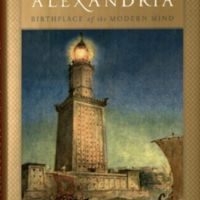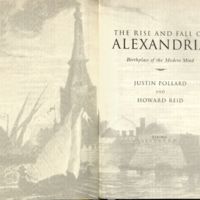The Rise and Fall of Alexandria: Birthplace of the Modern Mind
Dublin Core
Title
The Rise and Fall of Alexandria: Birthplace of the Modern Mind
Subject
Alexandria (Egypt) -- History
Alexandria (Egypt) -- Intellectual life
Alexandria (Egypt) -- Intellectual life
Description
Founded by Alexander the Great and built by Greek pharaohs, the city of Alexandria at its height dwarfed both Athens and Rome. It was the marvel of its age--legendary for its vast palaces, safe harbors, and magnificent lighthouse. But it was most famous for the astonishing intellectual fluorescence it fostered and the library it produced. If the European Renaissance was the "rebirth" of Western culture, then Alexandria, Egypt, was its birthplace. It was here mankind first discovered that the earth was not flat, originated atomic theory, invented geometry, systematized grammar, translated the Old Testament into Greek, built the steam engine, and passed their discoveries on to future generations via the written word. Julius Caesar, Anthony and Cleopatra, Jewish scholars, Greek philosophers, and devout early Christians all play a part in the rise and fall of the city that stood "at the conjunction of the whole world."--Publisher description.
Creator
Just Pollard
Publisher
New York : Viking
Contributor
Howard Reid
Table Of Contents
1 Flour and Sand 1 -- 2 Stealing a God 17 -- 3 Egypt Reborn 35 -- 4 The Legacy of Aristotle 46 -- 5 City of the Mind 60 -- 6 Greek Pharaohs 75 -- 7 The Music of the Spheres 93 -- 8 The Little O 108 -- 9 The "Eureka" Factor 122 -- 10 A Greek Tragedy 140 -- 11 The Last Pharaoh 156 -- 12 The Clockwork City 175 -- 13 Urbi et Orbi 191 -- 14 Dawn of the Iconoclasts 209 -- 15 Into the Soft Machine 224 -- 16 The Ascendancy of Faith 239 -- 17 The End of Reason 256 -- 18 Hypatia 266 -- 19 The Shipwreck of Time 280 -- Epilogue: A Distant Shore 289 -- Map of Alexandria 291.
Text Item Type Metadata
Original Format
Book
Citation
Just Pollard, “The Rise and Fall of Alexandria: Birthplace of the Modern Mind,” Humanities Hub, accessed February 28, 2026, https://humanitieshub.sdsu.edu/omeka/items/show/883.


